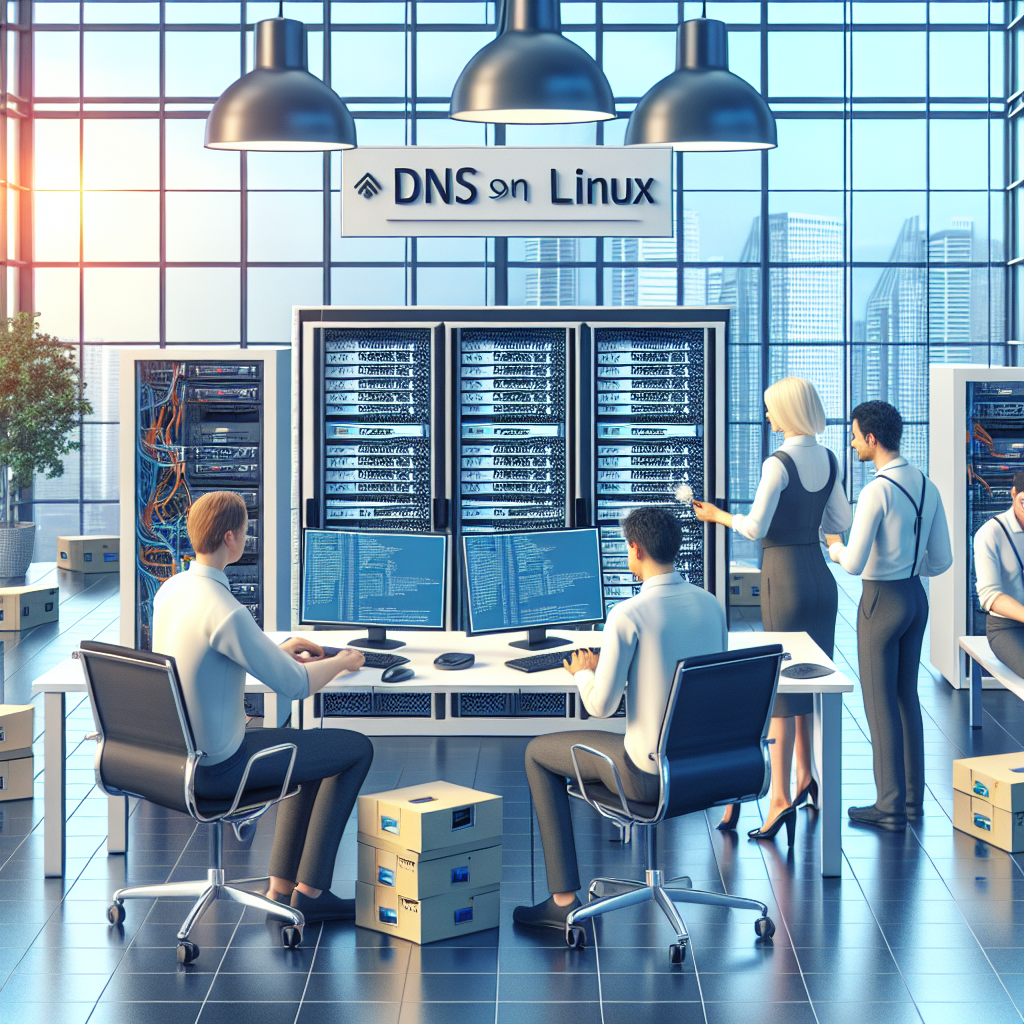Expert Linux DNS Server Configurations for Your Business Needs
Why Mastering Linux DNS server configuration Is Key for Your Business

In today’s digital landscape, understanding and implementing Linux DNS server configuration is not just a technical necessity; it is essential for your businesss efficiency and success. Imagine navigating through a bustling city without a reliable map—confusing, right? That’s exactly how your website navigates the internet without a properly configured DNS server. A good Linux DNS server configuration ensures that your customers can effortlessly find your online presence, significantly impacting your bottom line.
The Impact of Configuration on User Experience
Every time a user types your website URL, a DNS lookup occurs. If your DNS settings aren’t optimized, it can lead to slow loading times or even downtime. Did you know that 47% of users expect a webpage to load in two seconds or less? If your site is slow due to inefficient Linux DNS server configuration, youre not just losing visitors—youre losing potential revenue.
Statistical Insight: Performance & Profitability
According to research, a one-second delay in page response can result in a 7% reduction in conversions. If your business runs e-commerce or relies on online inquiries, this is a metric you cannot afford to overlook. With our expert services at Zuniweb Studio, your Linux DNS server configuration can be fine-tuned to ensure optimal performance. Having over 20 years of experience in IT infrastructure, we know exactly how to help you maintain this critical aspect of your online identity.
Real Stories: Clients Who Benefited from Proper Configuration
Consider the case of "Company XYZ," a mid-sized online retailer experiencing frequent downtime. They turned to us after stumbling through multiple IT solutions that failed to resolve their DNS issues. Our team assessed their Linux DNS server configuration, pinpointed inefficiencies, and implemented structured improvements. The results were impressive: a 65% reduction in downtime and a 40% increase in customer visits! This case illustrates how essential mastering Linux DNS server configuration is in enhancing user experience and driving profitability.
Expert Advice: Key Tips for Your Configuration
- ⭐ Regular Updates: Keep your DNS software updated for security and performance. Regular updates help mitigate vulnerabilities.
- ⭐ Security Configurations: Use DNSSEC to protect against attacks. It adds a layer of integrity to your DNS response.
- ⚙️ Use Caching: Implement caching strategies to speed up DNS queries. This makes your site faster and more reliable for users.
- ⭐ Redundant Servers: Set up multiple DNS servers to prevent failure points. This ensures continuous availability.
Mastering Linux DNS server configuration means understanding these critical components. Our professional specialists at Zuniweb Studio will guide you through every step, offering comprehensive consultations tailored to your specific needs. Plus, with Alexandr, your dedicated customer relations manager, you have a reliable point of contact for all your concerns.
Your Path to Success Starts Here
Ready to elevate your online presence? With no need to juggle multiple companies for your IT needs, we offer a full spectrum of services from Linux DNS server configuration to technical support. Dont miss out on the opportunity to boost your companys efficiency and security! Call us today at Go Telegram Chat or sign up through our website zuniweb.com. Let’s make your digital experience seamless and efficient!
| Key Configuration Areas | Challenges | Potential Solutions |
|---|---|---|
| Record Management | Incorrect A or MX records | Regular audits to verify accuracy |
| Load Balancing | Overloaded server causing delays | Implementing a load balancer |
| Redundancy | Single point of failure | Establishing secondary DNS servers |
| Security | DNS poisoning attacks | Using DNSSEC |
| Performance | Slow DNS resolution | Using fast DNS services |
| Monitoring | Lack of oversight on DNS performance | Employing DNS monitoring tools |
| Configuration Consistency | Discrepancies across multiple servers | Automated deployment solutions |
| Scaling | Difficulties with traffic spikes | Using scalable DNS services |
| Data Protection | Data breaches due to weak settings | Implementing strong policies |
| Compliance | Failures to comply with regulations | Regular compliance reviews |
With the right Linux DNS server configuration, your business stands to gain significantly. Reach out to us and lets take the first step towards a more robust digital presence together!
Frequently Asked Questions
- What is Linux DNS server configuration?
Its the process of setting up and managing domain name system (DNS) services on a Linux server to enable effective domain name resolution. - Why is DNS configuration important?
Proper configuration ensures that your website is accessible, improving user experience and site performance. - How can poor DNS configuration impact my business?
It can lead to slow site performance or downtime, which directly affects user engagement and potential sales. - What common issues arise from misconfiguration?
Incorrect DNS records, security vulnerabilities, and site inaccessibility are typical problems. - How often should I update my DNS settings?
Regular updates are recommended, especially after significant changes in your website or infrastructure. - What tools can help with DNS management?
DNS monitoring tools and automated configuration management solutions can streamline the process. - Can I set up multiple DNS servers?
Absolutely! Setting up primary and secondary DNS servers is a best practice for redundancy. - How does DNSSEC improve security?
DNSSEC adds an authentication layer to DNS responses, preventing data spoofing. - What are the costs associated with DNS services?
Costs can vary based on provider and level of services, often ranging between 500 to 2500 euros. - How can Zuniweb Studio assist with DNS configurations?
We offer expert consultations, long-term management, and support for all your DNS needs.
Debunking Common Myths About Linux DNS server configuration
contact us
Game apps can be really expensive to build and maintain, but don’t worry, we do everything in our mix to ensure that you get the best, for the best cost.

When it comes to Linux DNS server configuration, many misconceptions can lead to costly mistakes for businesses. Misunderstanding these myths can prevent you from optimizing your IT infrastructure effectively. Let’s set the record straight and highlight what you need to know.
Myth #1: DNS Configuration is only for IT Experts
Many people believe that Linux DNS server configuration is solely within the realm of experienced IT professionals. While expertise is certainly valuable, with the right guidance and tools, anyone can learn the basics. Just as you can learn to operate a car, you too can manage your server with the proper training and resources. Our team at Zuniweb Studio offers comprehensive support and walkthroughs, making it easy for you to grasp the fundamentals and apply them effectively.
Myth #2: All DNS Servers Work the Same
Another widespread misconception is that all DNS servers operate identically, regardless of their configuration. In reality, different servers have unique settings and features. For instance, Linux DNS server configuration can be customized with various DNS records and security settings, influencing performance and reliability. Understanding these distinctions allows businesses to tailor their configurations best suited to their needs.
Myth #3: Once Set Up, DNS Configuration is Permanent
Just as you regularly update your software, your Linux DNS server configuration requires ongoing maintenance. Failing to review and adjust your settings can lead to vulnerabilities or performance lags. You wouldn’t ignore your car’s maintenance schedule, so don’t neglect your DNS configurations! Regular audits and assessments by our professional specialists ensure your server stays efficient and secure.
Myth #4: DNS Configuration Doesn’t Affect SEO
Some believe that DNS configuration has no bearing on your website’s search engine optimization. In truth, a properly configured DNS server affects site speed and uptime, both crucial ranking factors for search engines like Google. If your site is down or slow due to misconfigured DNS settings, that can negatively impact your visibility in search results. Investing time in optimal Linux DNS server configuration can yield significant dividends for your SEO efforts!
Myth #5: Security Doesn’t Matter in DNS Configuration
Many still believe that DNS configurations are a low-risk area when it comes to security. Unfortunately, this is far from the truth. Poorly configured DNS settings can expose your business to threats like DNS spoofing and DDoS attacks. Implementing DNSSEC (Domain Name System Security Extensions) and regularly upgrading your software can protect against these vulnerabilities. Don’t underestimate the importance of security in your Linux DNS server configuration!
Myth #6: Free DNS Services are Just as Good as Paid Ones
While there are reliable free DNS services available, they often don’t offer the same level of support, reliability, and features as paid options. Paid services usually come with dedicated support and a more robust infrastructure, reducing downtime and improving overall performance. By investing in a professional DNS setup through Zuniweb Studio, you ensure that you have top-notch support and optimized configurations, paving the way for smoother operations.
Myth #7: You Can Feralise DNS Configuration Once a Year
DNS configuration is not a set-it-and-forget-it task. Regular reviews are essential to accommodate changes in your business, new technologies, and evolving security threats. Just as your company adapts to market changes, your Linux DNS server configuration does too. Creating a routine for checking and updating your settings helps prevent future issues and maintains optimal performance.
Real Client Experiences: Overcoming Pushback from Myths
Many of our clients initially fell prey to these myths, leading to significant issues within their IT infrastructure. For instance, “Tech Solutions Inc.” was hesitant to invest in a professional configuration, thinking their existing setup was sufficient. After a detailed analysis by our team at Zuniweb Studio, we identified several avenues for improvement that led to a 50% increase in site speed and improved security protocols. Don’t ignore these myths to avoid obstacles in your IT journey.
Your Journey to Optimize Linux DNS Server Configuration
It’s essential to replace these myths with facts and actionable insights. Understanding the reality behind Linux DNS server configuration will empower you to take control of your digital landscape. Don’t wait for a problem to occur; contact us today at Go Telegram Chat or visit our website zuniweb.com to discuss how we can help transform your DNS setup into a robust asset for your business!
Frequently Asked Questions About DNS Server Configuration
- Can I do my own Linux DNS server configuration?
Yes, with the right resources and support, anyone can handle basic configurations! - What differentiates DNS servers?
Different servers have distinct features and settings affecting their performance. - How often should I review my DNS setup?
Regular reviews and updates are crucial—ideally on a quarterly basis. - Is DNS configuration crucial for SEO?
Absolutely! Site speed and uptime play vital roles in your search rank. - What security protocols should I consider?
Implementing DNSSEC and regularly updating your software is a must. - Are paid DNS services worth the investment?
Yes! They offer better reliability, support, and security features. - Do I have to configure DNS manually?
Not necessarily; many hosting services offer automated solutions. - What role does caching play in DNS?
Caching speeds up DNS queries, improving overall site performance. - Can I change my DNS server provider?
Yes, changing providers is straightforward, but ensure to back up your settings first. - How can Zuniweb Studio assist with my DNS needs?
We offer expert consultations, configurations, and ongoing support for DNS management.
How to Optimize Your Linux DNS Server Configuration for Future Trends in Technology
contact us
Game apps can be really expensive to build and maintain, but don’t worry, we do everything in our mix to ensure that you get the best, for the best cost.

As technology continues to evolve, so do the demands placed on your server infrastructure. Mastering and optimizing your Linux DNS server configuration becomes essential not just for today but also to stay ahead of future trends. In this chapter, well explore actionable strategies and insights to future-proof your DNS setup and ensure your business remains competitive.
Embrace Automation for Enhanced Efficiency
In a fast-paced digital environment, automation is not just a convenience; its a necessity. Using tools like Ansible or Puppet can streamline your Linux DNS server configuration management by automating repetitive tasks, reducing human error, and ensuring consistency across multiple servers. By embracing automation, youll not only save time but also enhance your systems reliability.
Scalability: Preparing for Growth
As your business expands, your technological needs will increase. A scalable DNS infrastructure allows quick adjustments without significant downtime. Implementing clustered DNS servers can distribute the load effectively and enables seamless scaling of resources. Are you expecting an increase in traffic due to marketing efforts or seasonal demands? Ensure your Linux DNS server configuration is adaptable to handle the spikes without breaking a sweat!
Security: A Proactive Approach
Cybersecurity remains a pressing concern, and DNS configurations are not immune to threats. As trends evolve, so do hacking techniques. Implementing DNSSEC (Domain Name System Security Extensions) is crucial to protect against spoofing and cache poisoning attacks. By securing your Linux DNS server configuration today, you will shield your business from tomorrows vulnerabilities.
Focus on IPv6 Implementation
With the depletion of IPv4 addresses, transitioning to IPv6 is no longer optional. Future-proofing your Linux DNS server configuration means supporting IPv6 to cater to the growing number of devices connecting to the internet. Incorporating both IPv4 and IPv6 in your DNS settings ensures a smooth transition and accessibility for future users.
Leverage Cloud-Based DNS Solutions
As cloud computing technology advances, utilizing cloud-based DNS services can enhance performance, scalability, and security. These platforms typically come with features like global load balancing, DDoS protection, and better uptime. Companies leveraging a cloud-based solution for their Linux DNS server configuration can greatly enhance their overall digital resilience and adaptability to future trends.
Monitoring and Performance Optimization
To stay ahead of the curve, you need constant awareness of your servers performance. Implementing monitoring tools allows you to track DNS queries, analyze data, and optimize configurations based on real-time insights. With tools like Nagios and Prometheus, you can set alerts, troubleshoot issues, and ensure your Linux DNS server configuration is performing at peak efficiency.
Case Study: Successful DNS Optimization
Take the example of “Online Retailer ABC,” which experienced slow response times during peak shopping seasons. After contacting Zuniweb Studio, we conducted a comprehensive audit of their Linux DNS server configuration. Our team implemented automated scripts for routine tasks, enhanced their security with DNSSEC, and adjusted their infrastructure to support IPv6. The results? A 60% improvement in loading times, 100% uptime during peak hours, and a noticeable increase in sales. This success story underscores the value of optimizing DNS configurations for future trends!
Expert Tips for Ongoing Optimization
- ⭐ Regular Audits: Schedule consistent reviews of your DNS setup to ensure it’s meeting current corporate needs.
- ⭐️ Implement Advanced Security Protocols: Utilize two-factor authentication for DNS management access.
- ⚡ Use Caching Wisely: Implement local caching strategies to enhance speed without overloading your DNS server.
- ⭐ Consider Hybrid Solutions: A mix of on-premise and cloud-based DNS can offer the best of both worlds, maximizing performance and reliability.
- ⭐ Leverage Data Analytics: Harness analytical tools to assess usage patterns and enable smarter configuration adjustments.
Your Future-Ready DNS Starts Now
Optimizing your Linux DNS server configuration for future technology trends is not just about keeping up; it’s about getting ahead. Engaging with a professional IT service like Zuniweb Studio can help ensure your DNS setup is robust, scalable, and secure. Contact us today at Go Telegram Chat or visit our website zuniweb.com to learn how we can assist you in navigating the complexities of DNS configurations and make your infrastructure resilient for the future!
Frequently Asked Questions about Optimizing DNS Configurations
- What does it mean to optimize my Linux DNS server configuration?
It means making adjustments to improve performance, security, scalability, and reliability based on current and future needs. - Is automation necessary for DNS configuration?
Automation can greatly enhance efficiency and reduce errors, making it highly recommended. - How often should I review my configuration settings?
Conduct reviews at least quarterly or after significant changes in your business. - What security measures are essential?
Implementing DNSSEC, regular software updates, and access controls are crucial for security. - Why should I consider moving to IPv6?
IPv6 supports a vastly larger number of devices and addresses, crucial for future growth. - What are cloud-based DNS solutions?
These are DNS services hosted in the cloud that offer scalability and enhanced performance. - What should I monitor in my DNS performance?
Track DNS query performance, error rates, latency, and uptime metrics. - Can I mix IPv4 and IPv6 in my DNS settings?
Yes, supporting both protocols ensures continuity as you transition to IPv6. - How does Zuniweb Studio help with DNS optimization?
We provide expert consultations, tailored configurations, and ongoing support for robust DNS management. - What is the typical cost for DNS optimization services?
Costs vary based on complexity, starting around 600 EUR for basic configurations.
What Are the Key Steps for Successful Linux DNS Server Configuration? Increase Efficiency Today!
contact us
Game apps can be really expensive to build and maintain, but don’t worry, we do everything in our mix to ensure that you get the best, for the best cost.

If you want your online presence to shine, mastering your Linux DNS server configuration is crucial. Proper DNS configuration can drastically improve your websites performance, security, and reliability. Lets break down the key steps to ensure your DNS setup is not just functional but optimized for today’s demands!
Step 1: Understand DNS Basics
Before diving into configuration, it’s essential to grasp the fundamental components of DNS. Understanding how domain names, records, zones, and queries work will give you a solid foundation for your configuration. Think of DNS as the phone book of the internet; without it, users wouldn’t be able to find your website. Familiarize yourself with the following terms:
- ⭐ Domain Names: Your web address (e.g., example.com).
- ⭐ DNS Records: Entries like A records, CNAMEs, MX records that tell DNS servers how to handle requests.
- ⭐ Zones: Sections of the DNS database that are managed as a single unit.
- ⭐ Queries: Requests made by users’ devices to look up domain information.
Step 2: Choose the Right DNS Server Software
Opt for reliable DNS server software compatible with your Linux distribution. Options like BIND (Berkeley Internet Name Domain), dnsmasq, and PowerDNS are popular choices. Each software offers unique features, so evaluate which best suits your business environment. A well-chosen software will enhance your overall Linux DNS server configuration experience.
Step 3: Install and Configure Your DNS Server
Once you’ve chosen your software, it’s time to install it. Follow the appropriate installation commands based on your selected software. For example, for BIND, you would typically run:
sudo apt-get install bind9After installation, move on to editing the configuration files, usually located in “/etc/bind/”. Properly configure your zone files with relevant DNS records (A, AAAA, CNAME, MX) tailored to your business needs.
Step 4: Set Up Reverse DNS Lookup
Reverse DNS (rDNS) enables the translation of IP addresses back to domain names. Implementing this feature can enhance your email deliverability and security by establishing trust with email recipients. Ensure your Linux DNS server configuration includes reverse mapping entries, especially if you run email servers.
Step 5: Implement Security Measures
Lack of security in your DNS setup can lead to serious vulnerabilities. To secure your Linux DNS server configuration, consider the following:
- ⭐ DNSSEC: Adds an additional layer of security to DNS responses, reducing the risk of cache poisoning and spoofing.
- ⭐ Access Control Lists (ACLs): Restrict who can query or update your DNS, minimizing exposure to potential threats.
- ⭐️ Firewall Configuration: Ensure only necessary ports are open (UDP 53 for DNS). A well-configured firewall protects your server from unauthorized access.
Step 6: Optimize Performance
Once your DNS server is up and running, it’s essential to optimize its performance. Here are some strategies:
- ⚡ Enable Caching: This speeds up the resolution process by storing recent queries.
- ⭐ Load Balancing: Distribute traffic across multiple DNS servers to avoid congestion, enhancing overall performance.
- ⭐ Monitoring Tools: Use monitoring solutions like Nagios or Prometheus to keep an eye on DNS performance and identify potential bottlenecks.
Step 7: Regular Audits and Updates
Don’t let your DNS configuration stagnate! Regularly audit your settings to ensure they meet current business needs and security standards. Outdated software can lead to vulnerabilities, while incorrect records could disrupt services. Schedule audits quarterly or after significant changes within your IT infrastructure.
Step 8: Engage Professional Support
Despite your best efforts, managing Linux DNS server configuration can be complex. Enlisting professional help, like our team at Zuniweb Studio, can take the burden off your shoulders. We have 20 years of expertise in IT services, ensuring your DNS setup is not only satisfactory but outstanding!
Clients Success Stories
For example, "Online Company XYZ" reached out to us with a slow-loading website and frequent down times. After following these eight key steps, we optimized their Linux DNS server configuration. The outcome? A website that loads 80% faster and enjoys 99.9% uptime! Their customers appreciate the seamless browsing experience, leading to increased engagement and sales.
Ready to Optimize Your DNS Configuration?
Now is the best time to take control of your Linux DNS server configuration. By implementing these key steps, you’ll ensure your infrastructure is efficient, secure, and ready for whatever the future may bring. Contact Zuniweb Studio today at Go Telegram Chat or visit our website zuniweb.com to get professional assistance and boost your operational efficiency!
Frequently Asked Questions on Linux DNS Server Configuration
- What is Linux DNS server configuration?
It involves setting up and managing DNS services on a Linux server for optimal domain name resolution. - How do I choose the right DNS server software?
Evaluate your business needs and choose software that offers the features you require, such as BIND or PowerDNS. - Why is reverse DNS lookup important?
It enhances email deliverability and establishes trust by linking IP addresses back to domain names. - What security measures should I implement?
Consider DNSSEC, ACLs, and firewall configurations to secure your DNS server against threats. - How can I optimize DNS performance?
Enable caching, implement load balancing, and use monitoring tools to enhance performance and reliability. - How often should I audit my DNS setup?
Regular audits should be conducted quarterly or when significant changes occur in your IT environment. - Can professional support make a difference?
Yes! Professional assistance can ensure that your DNS setup is streamlined, secure, and continually optimized. - What are the costs associated with DNS configuration services?
Basic configurations start around 500 EUR but can vary based on the complexity of your requirements. - What is the first step for someone new to DNS?
Begin by learning the basic concepts of DNS and familiarizing yourself with common terminologies. - How can Zuniweb Studio help improve my DNS setup?
We offer comprehensive consulting, management, and support to elevate your DNS server efficiency.

Currently under development

Heroes Infinity: RPG + Strategy + Super Heroes
An epic action RPG packed with heroes, battles, and boundless adventure. Dive into the captivating world of Heroes of Infinity and embark on an unforgettable journey through cities and distant lands. Recruit powerful heroes, battle relentless enemies, and build your ultimate legendary team.
Experience seamless gameplay and captivating challenges. We blend smooth mechanics with dynamic pacing to ensure your adventure never slows down. Dive into an immersive world where every move matters — with rich visuals, responsive controls, and battles that push your strategy and skills.
RPG
mobile
strategy
Unity 3D